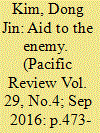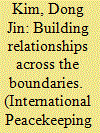|
|
|
Sort Order |
|
|
|
Items / Page
|
|
|
|
|
|
|
| Srl | Item |
| 1 |
ID:
146645


|
|
|
|
|
| Summary/Abstract |
This article discusses the link between development and peacebuilding to analyze South Korean aid activities in North Korea in the context of the Korean conflict, where there are deep-rooted cycles of conflict episodes, and to explore the possibility of aid for peace on the Korean peninsula in the future. The Korean conflict is a large part of what makes South Korean aid to North Korea ineffective. For the past 20 years, South Korean aid to North Korea has fluctuated greatly, due to the context of the Korean conflict. The Korean conflict, once seemingly on the way to resolution, appears to have reverted to a time before the end of the Cold War. Many people in both the North and the South still see each other as the enemy. Most of the South Korean aid projects in North Korea have been suspended indefinitely and the fluctuation of aid to North Korea caused serious debates within South Korean society. At one point, the debates grew so heated that they were called the ‘South–South conflict’. Building on the conceptual framework of conflict sensitive development and strategic peacebuilding, this article argues that, to overcome the current impasse, all stakeholders must better understand the context of the Korean conflict and the interaction between the context and themselves, and develop a comprehensive strategy together, to encompass the multiple issues raised by the Korean conflict, as strategic peacebuilding proposes.
|
|
|
|
|
|
|
|
|
|
|
|
|
|
|
|
| 2 |
ID:
153690


|
|
|
|
|
| Summary/Abstract |
The expectations for the role of civil society are growing due to an abysmal record of high-level political leadership in reaching an agreement and a sustainable peace process. How much impact can civil society have and what roles can it take in the peace process? This case study of South Korean civil society shows how the civil society was able to bridge the horizontal and vertical boundaries of the Korean conflict with the support of a global civil society, and created a hospitable public atmosphere for the peace process in the 1980s and 1990s. However, the space for the civil society to make a contribution in the Korean peace process required the interdependency of the roles of high-level and civil-society leadership in the interplay between the international and domestic political environments. The peacebuilding role of South Korean civil society demonstrates that the horizontal capacity of civil society alone cannot guarantee a breakthrough and sustainability in a peace process, but if it is coordinated with the vertical capacity, civil-society peacebuilding can be a useful platform for sustainable peacebuilding.
|
|
|
|
|
|
|
|
|
|
|
|
|
|
|
|
| 3 |
ID:
185860


|
|
|
|
|
| Summary/Abstract |
The COVID-19 pandemic has exposed increasing global inequality in responding to the issues of health. How do we resolve the tension between normative concerns for global responsibility and strategic concerns for national interest in facilitating health aid to vulnerable populations in low-income countries in the COVID-19 era? This article presents global health diplomacy as a conceptual framework that could overcome the dichotomy of humanitarianism and international politics, using health aid to North Korea during COVID-19 as a case-study. Health is a critical component of human dignity and can be a normative motivation for cooperation beyond sovereign borders. However, health is also an important element of national interest and can be a strategic motivation for transnational cooperation. The overlap between the moral and rational spaces in global health diplomacy demonstrates how COVID-19 assistance to North Korea's vulnerable population is in the enlightened self-interest of donors to prevent resurgences of new COVID-19 variants. Moreover, this framework imbues all parties, including aid recipients such as North Korea, with the global cooperative responsibility to address health. In this sense, global health diplomacy can reframe the tensions between humanitarianism and politics, morality and rationality, and cosmopolitanism and nationalism, from antithetical to complementary.
|
|
|
|
|
|
|
|
|
|
|
|
|
|
|
|
|
|
|
|
|